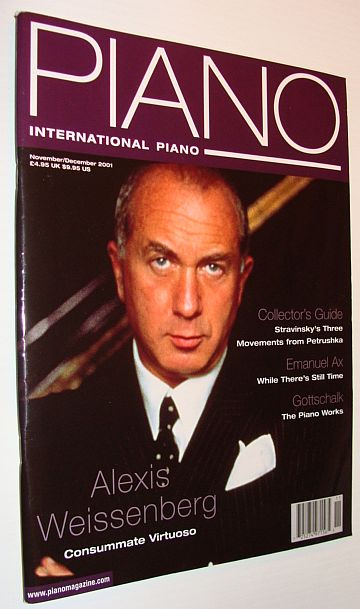Results are in for the 10th operetta conducting competition in Leipzig, and the result is a bit of a shock.
The winner is Joongbae Jee, a young man from Seoul who is based in Mannheim. He’s clearly going places now.
Results are in for the 10th operetta conducting competition in Leipzig, and the result is a bit of a shock.
The winner is Joongbae Jee, a young man from Seoul who is based in Mannheim. He’s clearly going places now.
Scott Rose has dug up for us a little-seen youtube video of Charles Aznavour appearing on the Nana Mouskouri in one of his darkest songs, Hier encore (Yesterday, when I was young). Aznavour is a master of his art. But just watch that piano man.
And here, below, is the more conventional accompaniment.
And here he is again with a Mozart-style accompaniment for Nana in ‘Plaisir d’amour’.
Oh, and here’s how not to sing it:
Some 24 hours after we broke the sad news on Slipped Disc, the Bulgarian Ministry of Culture has confirmed the death of Alexis Weissenberg, aged 82.
The announcement is being carried by the Associated Press and will be across the media within the hour.
UPDATE: Here’s the item on BBC News.
There has been a street war going on in BetShemesh, near Jerusalem, where ultra-Orthodox men have tried to ban the other half of the human race from public view. Then, on Friday, this happened (hat-tip to thejc.com).
Ahead of the April centenary of the sinking of the Titanic, a Lancashire composer has written a concerto in memory of Wallace Hartley, the violinist who led the ship’s orchestra as it went down. Peter Young comes from the same region as Hartley. Hear an extract here.
Hartley, according to his local newspaper, was a lifelong teetotaller. How he got into an orchestra may never be known.
There is a competition to name the concerto. The winner gets two free tickets to the premiere.
You’ve got to hand it to The Sun. Nobody beats their headlines and picture captions.
Good to see someone was moved by Katherine’s performance.
Enjoy here.
The family of Alexis Weissenberg confirmed his death this morning to a colleague of mine in Madrid.
There are several gaps in the great pianist’s life that may start to be clarified as the world takes stock of his achievement. The first is between 1957 and 1966 when, after a successful international career, Alexis disappeared from the world’s concert halls. He was living in Paris at the time, teaching, reading and finding his inner voice.
In a book-length conversation with Gustl Breuer (details below), Alexis explained that he hated the way music became a business and an athletic contest. In self-exile, he began to explore the visual aspect of his art. A film he made in 1966 of Stravinsky’s Petrushka caught the eye of Herbert von Karajan, who was thinking along the same lines. ‘That was the beginning of the end of my peaceful years,’ he said.
William Steinberg, who had taken an interest in Weissenberg from the outset, shared a superagent with Karajan – Ronald Wilford. Once he heard the Alexis was back in action, filming the Tchaikovsky first piano concerto in Berlin, Steinberg urged Wilford to bring him on tour to the US. Karajan followed up with the Rachmaninov C minor concerto (video).
Did he regret the empty decade? Alexis was asked. ‘Not in the slightest,’ he replied.

Later, he moved from Paris to the relative tranquility of Madrid, where he married and had two daughters. As Rodrigo Carrizo Couto points out in his obituary in El Pais today, little is known of his life in Spain.
In the last 15 years he virtually stopped playing, until Martha Argerich, who found him living in Lugano, brought him back at her Festival.
Like all great musical legends, Alexis Weissenberg died with his enigma intact.
Here’s a wonderful pic of the young Alexis with his teacher, Pantcho Vladigerov.
Bibliography: Breuer, Gustl: Alexis Weissenberg. Ein kaleidoskopisches Porträt (ISBN: 3792502313 / 3-7925-0231-3) Rembrandt Verlag, Berlin, 1977, 1984 |
Heiner Goebbels, director of the Ruhr Triennale, has let slip that he plans to open his festival in August with Europera 1 & 2 by John Cage.

Unstaged in Europe since the 1987 Frankfurt premiere the pieces involve a blindfolded soprano and a mezzo in rabbits’ ears (Playboy, anyone?). There are three further operas in the sequence.
Cage, born September 5, 1912, would have turned 100 this summer.

photo: Cage, by Betty Freeman ((c) Lebrecht Music & Arts)